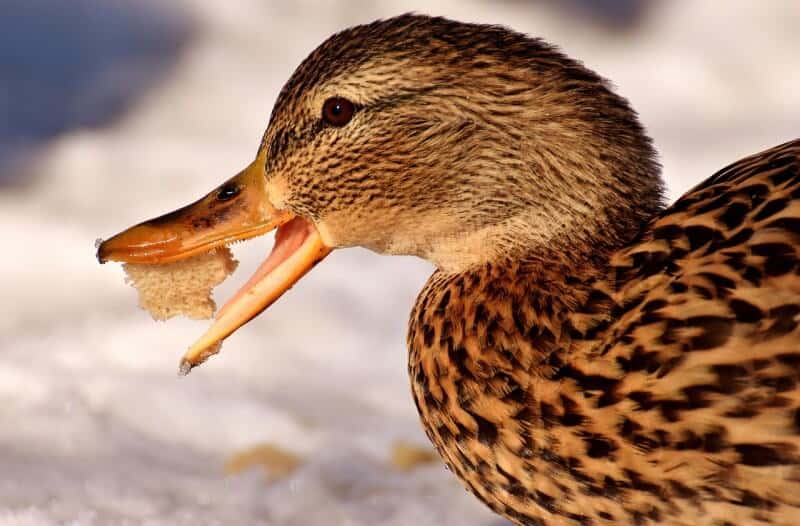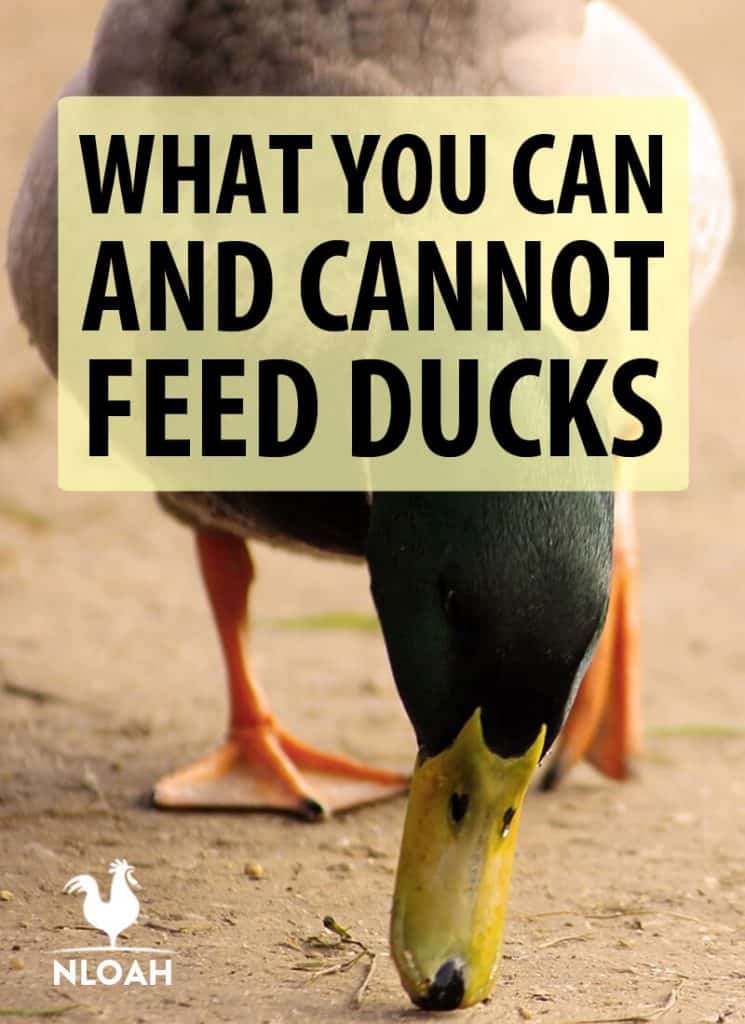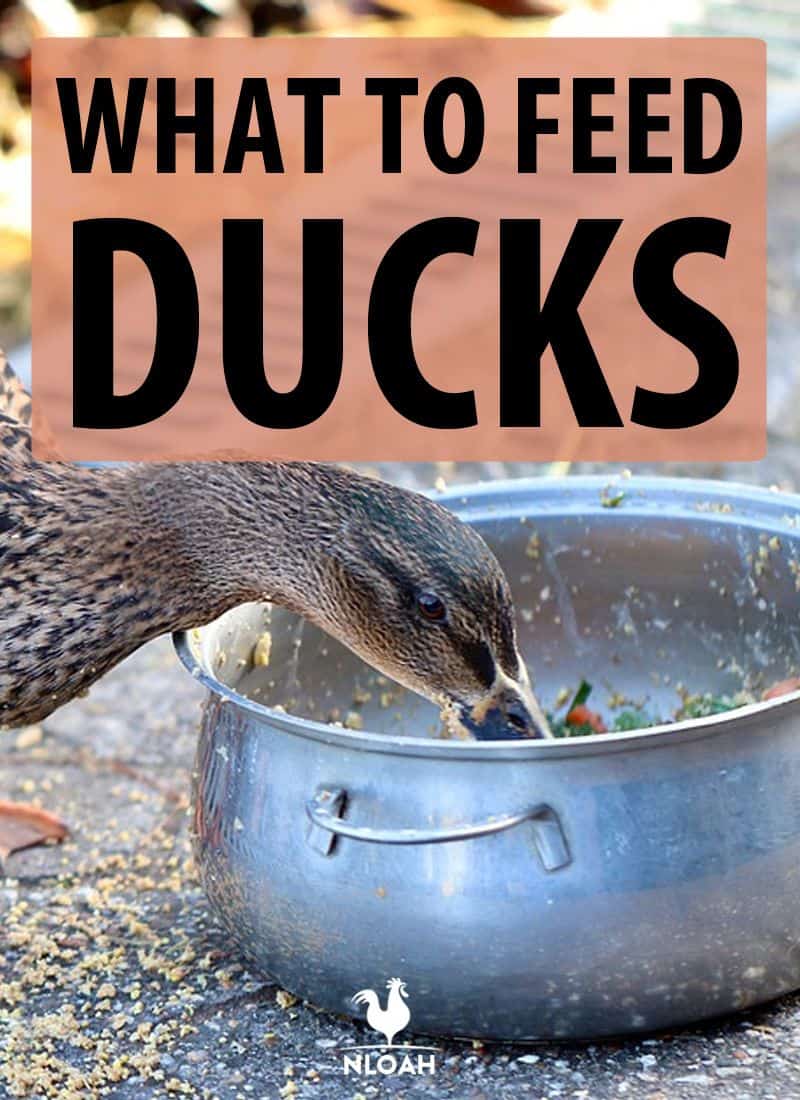Is It Ok for Duck to Eat Chicken Feed
What you can and what you cannot feed your ducks is a topic that can elicit heated debate, just as it often does when the same question is posed about any type of livestock.
Searching online for answers to the safe duck treats vs. toxic duck treats can be quite a frustrating endeavor. One website will have the same item on a safe or in limited amounts column as another will have in the toxic never feed category.
The duck food information and lists you will find in this New Life On A Homestead article were compiled from primarily my own many years of duck husbandry experience, tips from other homesteaders who have also kept ducks for a long time, chats with our livestock vet, and from a bit of cross-referenced online research.
Duck Eating Habits
Ducks, like chickens, are omnivorous poultry birds. They are avid browsers and foragers, and tend to chomp their cute little beaks onto anything that intrigues them.
On average, ducks consume about seven ounces (approximately 200 grams), and two cups of food daily when mature.
If you are raising ducks for meat, the amount of food provided is usually increased. A higher protein and calcium diet can foster both better quality and quantity of eggs.
We free range our ducks and chickens most days, so they have ample access to their natural diet.
On days when they are left inside their spacious run and during evening put up, they are given healthy treats.
Nature knows best, so I try to keep the daily feed rations and supplements as close to what the ducks would encounter in the wild as possible.
Typical Wild Duck Diet
When ducks are left to their own devices in the wild or when free ranging, these are the commonly available (and healthy) food sources they will be attracted to the most:
- Tadpoles and frogs
- Salamanders and various other small amphibians
- Wild berries
- Fish eggs and small fish
- Grass, weeds, and leaves
- Worms
- Snails
- Slugs
- Mollusks
- Crawdads and other small crustaceans
- Aquatic plants and their roots
- Algae
- Insects – both on land and in the water: hornworms and potato bugs tend to be their favorites.
- Nuts
- Wild fruit
Ducks also require some type of grit in their diet – gravel, san, or crushed shells. The grit helps the birds to digest their food properly and also infuses trace amounts of calcium and other vital minerals into their diet.
Duck Treats as a Training Tool
Supplying extra healthy treats and proper feed helps ensure all of the ducks' nutritional needs are being met.
A duck with a poor diet can suffer breeding failures, stunted growth, poor muscle development, and low feather growth and strength ratios.
I begin giving our ducks, chickens, and guineas a healthy treat at dusk when they are still itty bitty and living in a brooder as part of their training. The birds all learn to converge in or near their coop and run (or the brooder door) when the sun starts to go down.
Sure, an ornery bird will still sometimes make me give chase to get it to go inside its home in the evening, but that is a rarity.
All of the birds know if they are late for "beak and bill count" they will not be getting a treat that day.
What Ducks Can Eat
Chick Starter – This type of poultry bird manufactured ration is designed to be fed to chicks, ducklings, and keets – baby guineas. It can be purchased in either medicated or unmedicated form.
The young poultry birds eat this easily digestible and tiny crumble style of feed rich in proteins and essential nutrients. The little flock members should be on this type of feed for about one month.
Crumble Feed – Some folks believe that crumble can cause choking, but in my experience, pellet feed stands more of a chance of doing that – especially in ducks.
Developing poultry birds as well as their mature counterparts can eat this type of feed daily along with natural and healthy treat supplements.
Layer Pellets – While drakes and roosters (male poultry birds) can eat this type of feed, it is designed for both duck and chicken hens of laying age.
Mash – This soft granular type of feed is a mixture of crumble and scratch in texture. It includes ground up cracked corn, which ducks really love. Some members of my flock, both past and present, absolutely love mash feed – but others hate it terribly.
My current batch of ducklings and keets just transitioned to mash from chick starter and really like it, but my mature flock members would only eat it if they were starving.
Scratch – While scratch feed is most often fed to chickens, ducks will eat it too. Some keepers contend that ducks love scratch and pecking on the ground like chickens. This has not been my experience at all, but I do no doubt that some duck breeds could very well love it.

Duck Watering Tips
To help keep a steady supply of clean water in your duck hut and coop (I raise my ducks with my chickens and roosters) I recommend using a hanging waterer. Ducks are messy, and will get their feed, mud, and feces into a standing waterer.
Ducklings are voracious eaters. If they do not have enough water to wash down their feed it can get stuck in their crop and cause a potentially deadly infection – or outright choking.
Ducks drink a lot – I mean a whole lot, of water. The five ducklings we recently hatched are drinking about five gallons of water a day.
Those little Mason jar style waterers on display in the poultry section of agriculture stores when they host "chick days" twice each year work fine for chicks, but you would have to refill it hourly if using it with ducklings.
Natural and Free Range Snacks for Ducks
- Weeds and Herbs – When left to their own devices free ranging, ducks will seek out dandelion, wheatgrass, parsley, rosemary, oregano, rosemary, calendula, and mint. If you do not permit your duck flock to free range, simply pick any of these items and place them into the run as a free choice treat. The herbs all hold medicinal properties that help boost a bird's immune system and thwart respiratory infections.
- Insects – A duck will eat any old bug, and it will fine. As long as you provide a constant water source, ducks can be placed in a "chicken tractor" or growing area border run, and help keep bugs out of your garden. It is also quite fun to watch a flock of ducks jump with excitement and then run water hornworms, June bugs, and potato bugs.
- Worms – Mealworms, whether found in your yard or purchased from a store, are always a favorite treat for ducks. The flock will get extremely excited when it rains, because worms will be moved closer to the surface, and make them far easier to snatch up with reckless abandon.
- Grass – When exposed to grass in their run or when free ranging, ducks will seek out grasses and seed heads of all sorts.
- Tadpoles and Fish Eggs – Ducks will definitely keep the number of noisy bullfrogs down in your homestead pond. They love to eat tadpoles and fish eggs with any chance they get.
- Wild Berries – Unless you do not mind sharing the wild berries on your homestead with the duck flock, you had better keep them fenced in. Ducks are not picky, they will readily consume cultivated berry bushes as well, especially black raspberries.
- Sunflower Seeds – Any type of sunflower seeds will delight your flock of ducks, but black oil sunflower seeds tend to be their favorites.
Safe Treats For Ducks
These treats can be given in moderation on a daily basis. It is always best to give treats only after the flock has eaten their daily feed ration. Like kids, ducks will pick eating a treat over their regular meal every time.
Vegetables
- Broccoli
- Cucumbers
- Corn – cracked corn or cooked corn on the cob poses the fewest choking concerns.
- Peas
- Cooked beans
- Kale
- Lettuce – romaine lettuce is the most nutritious. Iceberg lettuce holds no nutrients for the ducks and should not be given with regularity. Some keepers recommend never giving iceberg lettuce, but it doesn't harm the ducks, is easy to grow and cheap to buy – making it a great training aid in my book. Some duck keepers have witnessed scours (diarrhea) from ducks and chickens after they eat iceberg lettuce.
- Sliced Apples – no seeds or cores
- Pumpkin – chopped
Fruits
- Grapes – chopped
- Watermelon
- Berries – raspberry, blackberry, black raspberry, strawberries, and blueberries are recommended.
- Cantaloupe
- Bananas
Grains
- Oatmeal – uncooked and sprinkled onto feed or cooked. During the long cold days of winter, my ducks think I am their hero when I arrive at the coop with a warm bowl of oatmeal
- Pasta – Cooked pasta is also a favorite of my poultry birds. I do not give it daily, but once or twice a month as a special treat.
- Whole Grains – Wheat, barley, and oats are the most nutritious grain treats you can provide your ducks and are often ingredients in homemade poultry bird feed. Beefing up the whole grain intake of the duck may help increase both the quantity and quality of eggs they produce.
- Cooked Rice – This is also an occasional grain treat for my flocks. Even though some duck keepes swear it is a favorite, none of my ducks or chickens have really seemed to be enthuse by rice snacks.
- Brewer's Yeast – Adding a little bit of yeast to the daily food ration or mixed in with healthy treats can improve their overall health and prevent nutrient deficiencies due to its high percentage of niacin.
- Hard Boiled Eggs – Give the flock some hard boiled eggs to infuse more protein into their diet. Finely chopping up egg shells and tossing them on top of treats or the daily feed ration can help boost the calcium intake of the ducks – which in turn can improve egg laying and shell hardness during the cold weather months.

Controversial – Bread
Oh the controversy over bread. It does not hold any real nutritional value and will be gorged upon by ducks as they neglect their feed, if allowed. Too much bread can cause the ducks to become bloated or encounter digestive issues – usually temporary.
I give my ducks a small amount of whole wheat bread as a treat, especially during training. They only get the bread in the evening after they have finished their healthy and nutrient rich food.
I always make sure they have ample water to wash the small bites down with when serving it as a treat.
Even if I get bashed soundly online for serving small bites of bread as treat, I am not going to change my habits. I look at it like ice cream and cake – fine in small amounts once in a while.
My ducks have never become bloated or experienced ill effects from bread treats. They surely do not need bread, so there is no reason to feed it to them if doing so seems risky to you.
What You Should Never Feed Your Ducks
Salty Foods
Never feed your ducks salty treats like chips, peanuts, or similar junk food items.
Citrus Foods
Eating citrus fruit may disrupt the ability to properly absorb calcium in ducks. When a duck's calcium content is low her egg laying habits will likely decrease and the shells will be thin and break easily.
Spinach
Like citrus fruits, spinach can also cause problems with the calcium absorption of the ducks, and cause weak eggs.
Potatoes
Leaves and stems from potato plants are toxic to ducks, as are the vegetables they produce.
Sweet potatoes are not a part of the nightshade family but are a part of the morning glory family and are safe to provide to the flock as an occasional treat.
Green Tomatoes
Because they are part of the nightshade family, and contain a toxin called solanine, these too are toxic to ducks. Solanine is known to attack red blood cells, cause heart failure, and scours.
Some keepers chop up red tomatoes and give to ducks as a once-in-a-while treat because they are supposed to be safe. I have opted to just skip tomatoes altogether as treats due to worries over toxicity.
Eggplant
This vegetable is also a member of the nightshade family and is therefore toxic to ducks, and should never be given as a treat.
Sweets
Do not ever give your ducks sweet snacks or especially chocolate – which can be toxic. The ducks are unable to process artificial sweets properly.
Mouldy Food
When poultry birds consume mouldy or rotting food it can cause deformities in offspring, hamper wing growth, and cause aspergillosis – a potentially fatal infection of the lungs.
Avocado
Never feed poultry birds the skins, flesh, or pits of avocados. They are toxic to the birds and can cause myocardial necrosis.
Rhubarb
The raw leaves from this plant contain oxalic acid, which is toxic. Consumption of rhubarb can cause thin shelled eggs, as well.
Onions
Ducks (and many types of livestock) cannot eat onions because they contain thiosulphate. This toxin kills red blood cells and can cause both fatal anemia and jaundice hen consumed in large amounts.
Caffeine
Do not give tea, coffee, or pop to your ducks because caffeine is a methylxanthine.
Dairy
Milk, yogurt, cheese, and the like can give scours to poultry birds because their digestive systems are not set up to process milk sugars. Some keepers give dairy products in small amounts as a rare treat, but I do not because of the risk of potentially life threatening scours.
A toxic or allergic reaction to the consumption of specific types of food might not be either immediate or visible. Sometimes the build up of the distressing foods take time to build to a life threatening level.
Common symptoms that a poultry bird has consumed something harmful include: scours, rapid heartbeat, hemorrhaging, congestion, kidney failure, visceral gout, poor egg quality or reduced egg laying, or convulsions.
Ducks, like most animals, will naturally avoid food that is bad for them. But you must remove any potentially toxic plants or wild weeds from their free-range area or around their coop and run.
Treats, even healthy ones, should not be more than 10% of a duck's daily diet.


Source: https://www.newlifeonahomestead.com/what-you-can-and-cannot-feed-ducks/
0 Response to "Is It Ok for Duck to Eat Chicken Feed"
Postar um comentário